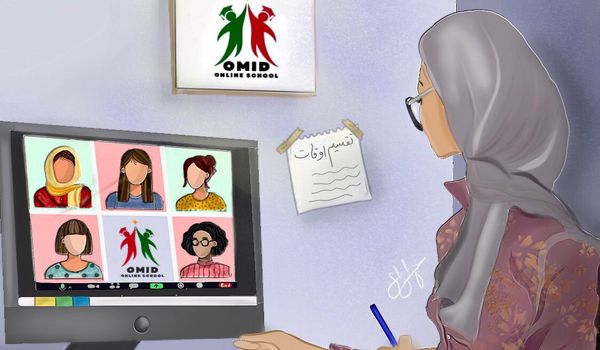Over seventy Afghan diaspora-led organizations operate in Austria, most of which are based in Vienna. These diaspora organizations’ programs cover important topics, such as online education for girls and women, climate change issues, especially those relating to water resource management, humanitarian assistance, and effective fundraising initiatives. Ali Ahmad from VIDC interviewed the Omid Online School’s founder Zahra Hashimi about the importance and gravity of education in Afghanistan.
Afghan Diaspora launched dozens of online schools
People in Afghanistan often echo inventor and scientist Alexander Graham Bell’s famous statement “If one door closes, another opens,” although with a slight change: “If one door closes, hundreds more doors will open.” For some, a closed door might mean failure or loss, while for others, failures are opportunities for themselves and the people around them.
Education is often taken for granted in many parts of the world, but it is a distant dream for Afghan girls and women. Since the Taliban’s return to power on the 15th of August 2021, Afghan girls and women have been the main target of human rights restrictions. Upon taking power, the Taliban closed school doors to girls after sixth grade. In December 2022, de facto authorities issued an edict that banned girls and women from attending universities and working for international aid organizations.
In the midst of this despairing situation, the Afghan diaspora launched dozens of online schools to defy the Taliban’s ban on education. Among several online school founders, Zahra Hashimi, 27, a former teacher in Afghanistan who now resides in Vienna since 2015, has emerged as a beacon of hope for hundreds of Afghan girls denied this fundamental right. Afghan girls are aware that there is no future for them under the Taliban, yet they continue to struggle and strive. In an interview with the author, Hashimi stated, “They are searching for a sense of normalcy and hope that education used to provide.”
A Safe Haven for Girls

Hashimi experienced a traumatic past as a girl in Afghanistan. She was driven by Afghan girls standing in front of closed school doors, eyes filled with tears reflecting their desire for education. Hashimi used her experience teaching mathematics to fifty girls through an Instagram post. Contrary to her expectations, 300 girls signed up for her programs. The young girls’ unwavering tenacity and bravery motivated Hashimi to expand her activism into an online school—Omid Online School. In the Dari language, Omid means hope.
The Omid Online School serves as a safe haven and social hub for young Afghan girls and women. The school builds connections, and girls learn from each other, participate in group activities, and escape the daily challenges of Taliban-controlled Afghanistan. The girls are so eager that they continue their education, even during holiday periods, and Omid has become an essential part of their lives. “The girls have embraced the school as a source of hope and a pathway to a brighter future. It has provided them with a sense of perspective and optimism.”
In the beginning, to provide continuity in anticipation of regular schools and allow girls to transition and advance without difficulty, the school followed the Afghan Ministry of Education’s (MoE) curriculum; however, the hopes of the girls were dashed by more restrictions on women’s freedoms. Accordingly, the school reduced the number of regularly taught subjects from 13 in its first year to seven regular subjects and three extracurricular subjects in its second year.* Those three subjects are taught in seminars, each twice a month. As of June 2023, the school has an administration team, thirty-five volunteer teachers (in Afghanistan and throughout the Afghan diaspora communities), and 540 students from seventh to twelfth grade.
Hashimi works for Fremde werden Freunde (Strangers Become Friends), a civic engagement initiative that fosters the social inclusion of people with migration backgrounds in Austrian society. As a registered Fremde werden Freunde project, the Omid Online School receives valuable technical support and help to manage donations from the organization. Hashimi also worked as a travel journalist and influencer for Darya, a media outlet owned by Saad Mohseni’s well-known Afghan business conglomerate, Moby Group. In 2022, she hosted the first season of the show “Didar,” and she still intends to do the following season.
Navigating Challenges: Overcoming Barriers to Education in Afghanistan

Registering Omid as an official online school has remained a challenge for Hashimi and her team. Despite her open criticism of the Taliban, she still attempted to register the school with the Afghan MoE hoping that the Taliban would permit girls to continue their studies online and perhaps project a positive image of themselves. The Taliban refused to register the school. “I openly criticized them everywhere, not expecting that one day I would have to work with them,” Hashimi said.
The school runs on donations to pay for necessities like internet access for teachers and a limited number of students, and these financial restrictions pose a significant challenge to the short- and long-term prospects of the school’s operation. Hashimi has spent most of her time raising money to keep the school running, but the school’s future remains uncertain. What is certain in the midst of uncertainty is that Hashimi is committed to finding long-term sponsors and reliable funding opportunities.
The school faces many other challenges, with many students lacking access to the internet and mobile devices. Their ability to learn is hampered by sharing one device among family members. In Afghanistan, living in close quarters with limited privacy makes things even more difficult, and cultural restrictions frequently preclude intervention in situations where girls are forced to marry young rather than continue their education. Despite these difficulties, the students demonstrate incredible bravery and tenacity in their quest for a sense of normalcy and hope in a culture that prioritizes exclusion and gender-based violence. According to Hashimi, many students experience mental health issues—frequently stigmatized—and are reluctant to seek help. Tragically, there have been incidents of student suicide with ensuing negative effects on teachers’ and other students’ motivation. Despite these challenges, Hashimi and her team persevere by providing psychological support to help students in precarious situations manage their emotions. The girls’ extraordinary drive and bravery continue to motivate everyone involved, highlighting the school’s significance as a source of hope in a war-torn country. During her interview, Hashimi reported that educators receive threats and intimidation from the Taliban, and her team has been cautious about ensuring the safety of school, teachers, and students.
The Impact and Future of Omid Online School

Despite multiple challenges, the school has produced inspiring success stories. The transformation of a former math teacher’s daughter is one notable example. Although the girl initially lacked confidence, after graduating from the 12th grade from Omid, Hashimi recruited her to teach physics in the ninth and eleventh grades. The girl’s transformation from a shy student to a self-assured teacher is inspiring.
Two students from a rural area near Kabul, with no prior experience using smartphones, were given a chance to learn through Omid Online School. Their uncle, recognizing their talent, collaborated with Hashimi and her team to obtain a phone, with Omid covering their internet expenses. Despite their initial unfamiliarity, the students excelled and secured top positions in their classes. These achievements may appear small, but they “exemplify the transformative impact our school has on students’ lives,” Hashimi explained.
“I would adore extending our reach to places with internet service and giving the students access to the internet. Not just a hundred or a thousand girls in Afghanistan want this opportunity; there are millions of them. Although I’m prepared to continue this project, it won’t be sustainable without sufficient funding. It has been incredibly difficult,” Hashimi warned.
Omid Online School’s journey has been characterized by determination and hope. Although Hashimi initially hoped that regular schools would reopen, she now understands that her school would survive as a long-lasting educational institution and continue to offer essential support. Her future goals include securing funding, creating connections, and forming partnerships to increase the school’s impact and, maybe one day, establish it as a prestigious educational institute in Afghanistan.
“We implore people to raise awareness of and take action regarding the situation in Afghanistan. Afghan girls can benefit greatly from assistance in the form of online scholarships, used technology, instruction, workshops, and extracurricular activities like yoga,” Hashimi pleaded. The constant factor in girls’ independence and better futures is education. “Together, let’s stand up and change the world,” Hashimi said.
“We are not the same as the women who were ready to stay at home and raise children when the Taliban ruled between 1996 and 2001. The only key I can confidently discuss at this time is education, which is undeniably the key. Even though power and other factors may be significant, education is the one thing that lasts for the long haul,” Hashimi concluded.
* The seven regular subjects are math, Dari, biology, Pashto, chemistry, physics, and English. Three electives—history, geography, and Islam—are each taught twice a month in seminar format.

